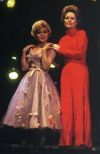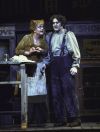Did "Company" revolutionize theater?
Tir Na Nog
Stand-by Joined: 3/31/05
#0Did "Company" revolutionize theater?
Posted: 10/11/06 at 7:12pmThe Original Broadway production. Was it revolutionary? If so, how?
#1re: Did 'Company' revolutionize theater?
Posted: 10/11/06 at 7:19pm
This isn't an essay question you want us to answer is it? ![]()
Company was revolutionary in that it has been considered the first "concept" musical, meaning that rather than have a specific plot, the structure of the show is based around the idea of a man reminscencing about his past on his birthday with no clear-cut timeline. It was also inovatative for its time in that it was a musical primarily about its audience, upper middle class middle aged couples and their problems, and this was during a time when escapism in the musical theatre was more mainstream.
If you need anymore answers, listen to the OBCR, it basically speaks for itself.
TheEnchantedHunter
Broadway Legend Joined: 6/27/05
#2re: Did 'Company' revolutionize theater?
Posted: 10/11/06 at 7:30pm
Technically, CABARET could also be considered the first 'concept' musical, even though it was plotted, by virtue of the eponymous locale serving as a central metaphor for the play and its staging.
"this was during a time when escapism in the musical theatre was more mainstream."
Hunh? Musical theater in the mainstream has ALWAYS been escapist.
Benay Venuta
New York City
Tir Na Nog
Stand-by Joined: 3/31/05
#3re: Did 'Company' revolutionize theater?
Posted: 10/11/06 at 7:36pmWhat about "Allegro"?
#4re: Did 'Company' revolutionize theater?
Posted: 10/11/06 at 7:45pm
Ok, "escapism" is the wrong word, I'm sorry ![]()
I guess I what I meant to say was that, while many other shows of the season had lighter subject matter, like Applause (a frothy movie to musical transfer), Coco (a star vehicle with a star who couldn't really sing and a revolving stage) and Oh Calcutta! (enough said), by comparison, Company was a show that dealt with themes more contemporary and closer to home with audience members.
Does that make more sense?
As for Allegro, do your own homework ![]()
Updated On: 10/11/06 at 07:45 PM
#5re: Did 'Company' revolutionize theater?
Posted: 10/11/06 at 7:49pm
Company is one of the most revolutionary pieces of musical theatre. Its concept was new to a point. I suppose you could say Cabaret and Zorba had some conceptual elements Company would develop.
And the introduction to the new team of Sondheim and Prince was of course in its own way, revolutionary.
#6re: Did 'Company' revolutionize theater?
Posted: 10/11/06 at 7:52pmNot theater in general; but it clearly ruined musical theater, forever.
Jazzysuite82
Broadway Legend Joined: 2/6/05
#7re: Did 'Company' revolutionize theater?
Posted: 10/11/06 at 7:53pm
Actually neither Company nor Carberet were the first concept musicals. That distinction goes to Kurt Weill for Love Life back in 1948. However, because no one really knows that show, Company did HELP revolutionize theatre. It brought the whole concept of the episodic musical back to the forefront. I think the reason why Company did that was not only because it was a brilliant piece of theatre, but because it was a hit (remember Tony nomination record...until The Producers). I think if the show were anything like Anyone Can Whistle in the way it was recieved, it wouldn't have had as big an impact.
Updated On: 10/11/06 at 07:53 PM
#8re: Did 'Company' revolutionize theater?
Posted: 10/11/06 at 7:58pmThe concept musical dates back a year further than Love Life, 1947's Allegro by Rodgers and Hammerstein.
Jazzysuite82
Broadway Legend Joined: 2/6/05
#9re: Did 'Company' revolutionize theater?
Posted: 10/11/06 at 8:07pmI suppose you could count that. It's structure was certaanly new. I guess I counted Love Life because it really had no linear plot. It was a series of sketches, sort of like a vaudeville piece. Allegro had a linear plot structured in a different way I think. EIther way they're close enough but the point is the same. It happened 20 years before Cabaret and Company.
TheEnchantedHunter
Broadway Legend Joined: 6/27/05
#10re: Did 'Company' revolutionize theater?
Posted: 10/11/06 at 11:42pm
Jazzysuite, it wasn't so much COMPANY's episodic structure that made it innovative but rather its time/spatial ambiguities, songs arising out of tension rather than emotion, and cubist-like perspective. But it is too much of a sui generis creation to have had any long-lasting influence. If any shows from the period can be said to have long-lasting influence, they would be the sung-through musicals of Lloyd Webber and the seamless blending of movement, song, recitative, and dialogue that is A CHORUS LINE. As for Sondheim, I think history will eventually prove him an innovator who was essentially an anomaly in his field and whose deconstruction of the genre ultimately brought the form to a dead end. So much for posterity.
Lorenz Hart
New York City
#11re: Did 'Company' revolutionize theater?
Posted: 10/12/06 at 12:36am
Are you in my Sondheim class? I just handed in a paper analyzing songs in Company...
I just think revolutionize is a very vague word. Because when you use it, people will bring in the point that it hasn't been copied or it wasn't the first. Really, there are very few that everyone would agree were truly revolutionary--Showboat, Oklahoma, West Side Story...maybe A Chorus Line.
But I think it's certainly fair to say Company was unique, if not a stronger word. People have mentioned the unique aspects--it not following a linear plot, but also kind of going in the opposite direction of Oklahoma--the characters don't sing their emotions in the traditional R&H style. Most of the numbers interrupt the action, act of is they're breaking the 4th wall to inform and define Robert's world. Still, this method isn't unique to Company.
Jazzy, was Company THAT well-received? It seems to have been very like...mixed, either critics loved it or hated it. The ones who hated it thought it was misanthropic and antimarriage and the characters were one-dimensional and underdeveloped, and audiences didn't like that it did not have a traditional plot. Did those who loved it outnumber the ones who didn't? Has it become more appreciated as time passed?
Oh, and from Joanne Gordon's book on Sondheim, here's great quotes explaining the mainstream vs. escapist part of it:
"Complex and challenging, it did not offer the escapist entertainment expected of the genre. Its characters were not romantic stereotypes but were uncomfortable close to the audience in both class and type....Audiences presumably went to the musical expecting to be soothed and stroked; Company jolted, discomforted, and disturbed...The creators had not compromised or condescended, creating instead a vital and unsettling evening of theater within a form that had traditionally striven for frivolty"
Ooh, another interesting thing, is that within this non-linear structure, Robert is not the traditional hero of a show who develops as he journeys forward. "The audience can perceive the cumulative effect of his experiences, but never has the sense of inevitable progression and growth that would suggest the gradual enlightenment of a hero."
So it did a lot of things different from most shows, but not all. So again, the answer lies in what you decide is revolutionary...
#12re: Did 'Company' revolutionize theater?
Posted: 10/12/06 at 12:44am
Ooh, another interesting thing, is that within this liner structure,
But the structure is not linear. That's part of what some consider "revolutionary" about it.
#13re: Did 'Company' revolutionize theater?
Posted: 10/12/06 at 12:51amSorry. Meant non-linear. Very bad typo/mind error. Edited.
#14re: Did 'Company' revolutionize theater?
Posted: 10/12/06 at 1:08am
Jazzy, was Company THAT well-received? It seems to have been very like...mixed, either critics loved it or hated it. The ones who hated it thought it was misanthropic and antimarriage and the characters were one-dimensional and underdeveloped, and audiences didn't like that it did not have a traditional plot. Did those who loved it outnumber the ones who didn't? Has it become more appreciated as time passed?
The first run of Company was almost 2 years long. For a Sondheim show, that's *really* good. And considering it's on its third revival on Broadway, I'd think that's rather well-received. You don't revive shows twice-over that no one likes.
I don't understand the debate over "what revolutionary means to you." Webster's dictionary defines it perfectly well: "constituting or bringing about a major or fundamental change." You could call Side by Side by Sondheim revolutionary because it was the first thing Cameron Mackintosh produced on Broadway. It doesn't make a difference if they were the first or the 15th to do it; if it brought about a major change, it was revolutionary.
Wanting life but never knowing how
#15re: Did 'Company' revolutionize theater?
Posted: 10/12/06 at 5:33am
I don't much like the term "concept musical," which was a term that neither Sondheim nor Prince ever applied to their shows.
If we're using it, I would certainly say that both Love Life and Allegro count. Sondheim, though he doesn't usually use the term, has said that As Thousands Cheer could be considered the first.
I would say that Love Life did have a linear plot, it just was presented in a discursive fashion and there was a nonrealistic concept at the heart of it. And, like Company, it had (though in different ways) time/spatial ambiguities, songs arising out of tension rather than emotion, and (arguably) cubist-like perspectives (though it's never entirely clear to me how cubism applies to plays and musicals).
I would say that Love Life was more of an influence on Cabaret, Hallelujah, Baby! and Follies, than on Company. Of course, one thing most of those shows shared (all except Hallelujah, Baby!) was Boris Aronson.
Btw, I would say that it's Alan Jay Lerner, not Kurt Weill, who deserves the credit for the form that Love Life took. Lerner was really one of the great innovators. It's also possible that The Day Before Spring was a bit of an influence on Follies.
I do think that Company was influential. I don't think A Chorus Line would have taken the shape it did or perhaps have even existed without Company.
Updated On: 10/12/06 at 05:33 AM
philcrosby
Broadway Legend Joined: 2/17/04
#16re: Did 'Company' revolutionize theater?
Posted: 10/12/06 at 8:36am
Oklahoma! was revolutionary.
Company is simply brilliant.
#17re: Did 'Company' revolutionize theater?
Posted: 10/12/06 at 12:11pm
I think FOLLIES is better.
But there is no doubt COMPANY changed the course of Musical Theatre.
#18re: Did 'Company' revolutionize theater?
Posted: 10/12/06 at 12:22pm
COMPANY is not an easy musical to warm to at first.
It all comes down to a divisive moment in the song “Side By Side by Side.” In turn each couple steps forward…one spouse does the first half of a time-step, only to have the dance completed by their partner. However, when the perpetually single bachelor Robert steps forward to do his half of a dance it is greeted with complete silence: he has no partner to complete him.
This was the "slap-in-the-face" moment that excited some theatre fans and irritated others. The enthusiasm of the first group further irritatetd the others.
Every time I see a production of the show - and lately I have been seeing more and more - I marvel at the construction and how well it works. I read that Sondheim created the score using character attitudes instead of emotions to fuel the songs.
I find the characters interesting. Not sympathetic, but interesting. Th same is true of the characters in FOLLIES.
WHat these two shows did establish was that it was Ok to present a musical with ambiguous stories and characters. I think that is why the show stands up so well to repeated viewings and interpretations.
Cast albums are NOT "soundtracks."
Live theatre does not use a "soundtrack." If it did, it wouldn't be live theatre!
I host a weekly one-hour radio program featuring cast album selections as well as songs by cabaret, jazz and theatre artists. The program, FRONT ROW CENTRE is heard Sundays 9 to 10 am and also Saturdays from 8 to 9 am (eastern times) on www.proudfm.com
#19re: Did 'Company' revolutionize theater?
Posted: 10/12/06 at 12:25pmIt was also a musical about contemporary New Yorkers with an ultra modern set, giving an even stronger sense of "revolutionary." The other shows mentioned are in one form or another, period pieces. Company was a modern show with a modern score told out of sequence and almost in a surreal fashion--how many birthdays does he REALLY have?
#20re: Did 'Company' revolutionize theater?
Posted: 10/12/06 at 12:27pm
Jazzy, thanks for beating me to the Weill/Lerner connection.
I think "Lady in the Dark" is even mentioned as a concept musical.
It certainly influenced a certain recent Oscar-winner, with its conceit of having musical sequences arise out of the central character's inner thoughts.
#21re: Did 'Company' revolutionize theater?
Posted: 10/12/06 at 12:31pm
And considering it's on its third revival on Broadway, I'd think that's rather well-received
- Well it's the second revival on Broadway. I think you knew that, just made a mistake. But it IS the third commercial production of COMPANY on Broadway.
Jon
Broadway Legend Joined: 2/20/04
#22re: Did 'Company' revolutionize theater?
Posted: 10/12/06 at 12:45pmI think A CHORUS LINE owes a lot to COMPANY, and to a lesser extent, FOLLIES. If Hal Prince hadn't hired Michael Bennett to choreograph those shows, do you think the whole idea of ACL would have come to him?
MargoChanning
Broadway Legend Joined: 4/5/04
#23re: Did 'Company' revolutionize theater?
Posted: 10/12/06 at 1:51pm
I actually think ACL owes a greater debt to FOLLIES than COMPANY, considering FOLLIES is about performers reliving and recreating (and often regretting) moments from their pasts, telling them in nonlinear fashion. COMPANY is all about modern relationships which, except for the Zach/Cassie subplot, isn't the concern of ACL (not to mention none of the characters in COMPANY are performers). Bennett also had a much deeper involvement with FOLLIES since he was co-director in addition to choreographer and had more of a hand in helping to shape the book (though Prince was primarily responsible for directing the book scenes between the main couples, Bennett took the lead in integrating the book into the staging of the rest of the show).
#24re: Did 'Company' revolutionize theater?
Posted: 10/13/06 at 3:01amWhat Company did was to show that a musical without any sort of traditional plot could work. Follies was an extension of this. But without Company, I don't think anyone, even Bennett, would have thought that you could do a musical without any conventional plot, like A Chorus Line.
Videos









